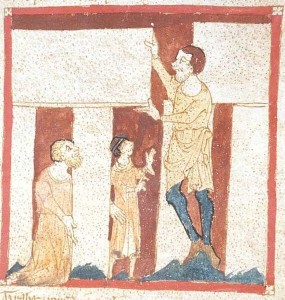Merlin, Song 4, ll. 322-348
In the Fourth Song, the rivers of Wales sing in praise of their country’s ancient heroes, including the wondrous Merlin. According to medieval legend, Merlin was a prophet and magician who aided the Britons against their enemies. Many of the tales about him, including the story that he transported Stonehenge from Ireland to Salisbury plain, were devised by the twelfth-century historian Geoffrey of Monmouth. Drayton seems especially interested by the story that Merlin employed fiends to build a wall of brass around his native town of Carmarthen. This was not an old legend, but the invention of another Elizabethan poet, Edmund Spenser.

A giant helps Merlin build Stonehenge. From a manuscript of the Roman de Brut by Wace (British Library, Egerton 3208)
When out the English cried to interrupt their song,
But they, which knew to this more matter must belong,
Not out at all for that, nor any whit dismayed,
But to their well-tuned harps their fingers closely laid,
Twixt every one of which they placed their country’s crowd,
And with courageous spirits thus boldly sang aloud:
How Merlin by his skill, and magic’s wondrous might,
From Ireland hither brought the Stonehenge in a night,
And for Carmarthen’s sake, would fain have brought to pass,
About it to have built a wall of solid brass;
And set his fiends to work upon the mighty frame,
Some to the anvil, some, that still enforced the flame,
But whilst it was in hand, by loving of an elf
(For all his wondrous skill) was cozened by himself.
For, walking with his Fay, her to the rock he brought
In which he oft before his necromancies wrought;
And going in thereat his magics to have shown,
She stopped the cavern’s mouth with an enchanted stone,
Whose cunning strongly crossed, amazed whilst he did stand,
She captive him conveyed unto the Fairy Land.
Then, how the labouring spirits, to rocks by fetters bound,
With bellows rumbling groans, and hammers thundering sound,
A fearful horrid din still in the earth do keep,
Their master to awake, supposed by them to sleep;
As at their work how still the grieved spirits repine,
Tormented in the fire, and tired at the mine.
Edmund Spenser, The Faerie Queene (1590).
Book 3, Canto 3, Stanzas 7-11
Description of Merlin’s Cave
Forthwith themselves disguising both in straunge
And base attyre, that none might them bewray,
To Maridunum, that is now by chaunge
Of name Cayr-Merdin cald, they tooke their way:
There the wise Merlin whylome wont (they say)
To make his wonne, low underneath the ground,
In a deepe delve, farre from the vew of day,
That of no living wight he mote be found,
When so he counseld with his sprights encompast round.
And if thou ever happen that same way
To travell, goe to see that dreadfull place:
It is an hideous hollow cave (they say)
Under a rocke that lyes a little space
From the swift Barry, tombling downe apace,
Emongst the woodie hilles of Dynevowre:
But dare thou not, I charge, in any cace,
To enter into that same balefull Bowre,
For fear the cruell Feends should thee unwares devowre.
But standing high aloft, low lay thine eare,
And there such ghastly noise of yron chaines,
And brasen Caudrons thou shalt rombling heare,
Which thousand sprights with long enduring paines
Doe tosse, that it will stonne thy feeble braines,
And oftentimes great grones, and grievous stounds,
When too huge toile and labour them constraines:
And oftentimes loud strokes, and ringing sounds
From under that deepe Rocke most horribly rebounds.
The cause some say is this: A litle while
Before that Merlin dyde, he did intend,
A brasen wall in compas to compile
About Cairmardin, and did it commend
Unto these Sprights, to bring to perfect end.
During which worke the Ladie of the Lake,
Whom long he lov’d, for him in hast did send,
Who thereby forst his workemen to forsake,
Them bound till his returne, their labour not to slake.
In the meane time through that false Ladies traine,
He was surprisd, and buried under beare,
Ne ever to his worke returnd againe:
Nath’lesse those feends may not their worke forbeare,
So greatly his commaundement they feare,
But there doe toyle and travell day and night,
Untill that brasen wall they up doe reare:
For Merlin had in Magicke more insight,
Then ever him before or after living wight.
